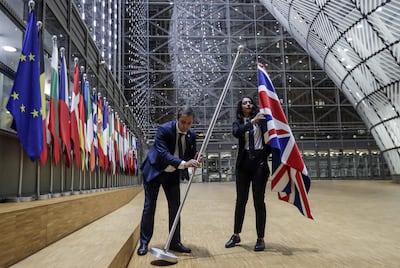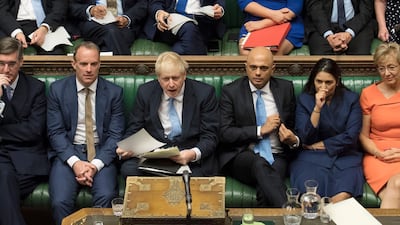The European Union lost one of its stars on Friday night as Britain left the bloc to strike out as a sovereign, independent state.
This spurred the British anti-Brexit campaign group Led by Donkeys to laser-display one of the 12 gold stars of the EU flag on the cliffs of the southern coastal town of Dover with a message to keep the symbol safe until Britain one day returns to the continental grouping. On the prospect of this happening, no one can predict the future; the economist John Kenneth Galbraith once quipped that the only point of forecasting was to make astrology look reliable.
Meanwhile, the government in London is looking to shape the country’s destiny from a much different perspective.
From its viewpoint, the new autonomy enjoyed by the UK will mean securing trade deals that are better suited to the structure of the country's economy. It will mean faster, more clear-cut policymaking. It will grant more scope for independent, effective diplomacy.
Importantly, the UK will no longer operate under the shadow of encroachment on its national strategic interests. This means the behemoth that is the financial centre in the City of London will offer its traditional advantages unfettered by excessive regulation.
It is tempting to see, as the critics of Brexit do, this decision as a leap into a dark place where the forces of nationalism are stirring. But that would be to disregard the assurances coming from Prime Minister Boris Johnson’s government that a modernisation project is in the works to make the country work better for all its citizens.
So what are the prospects of remoulding Britain as a best-in-class international player?

A key test will be a forthcoming overhaul of the country’s sanctions policy. While the transition period of leaving the EU is in place until the end of 2020, this will be a gradualist endeavour. According to a notice issued by the UK treasury, British companies and other entities will continue to comply with the EU’s sanctions policies throughout the year. Foreign Secretary Dominic Raab used a speech to foreign correspondents in London last week to touch on this point. Lawyers specialising in this area expect human rights-related sanctions to be unilaterally imposed under what is called the "Magnitsky amendment" to Britain’s most recent sanctions act as soon as March.
Compliance with the British sanctions regime will be distinct from that of the EU, which could affect licences to operate in one place but not in another. But sanctions policy is an important issue because it will measure how closely aligned Britain is with its European neighbours. Brussels, Paris and Berlin can hug Britain tight and ensure London has little incentive to drift further away. A more nimble national decision-making process should be faster at imposing sanctions and tweaking its policies for strategic effect. And Europe could end up following the British lead in many instances.
Last week, Mr Raab was at pains to showcase how the country had remained close to France and Germany with regard to its Iran policy. While the British Foreign Office maintains that keeping the 2015 deal restricting Iran’s nuclear programme is a must, there has already been some political divergence. Britain has not joined the policy of maximum pressure on Iran. However, Mr Johnson has thrown his weight behind a “Trump deal” with Iran that addresses the gamut of international concerns over Tehran’s policies.
Key questions are now crowding in on the British government machine.
Mr Raab was also on stage during the week with the US Secretary of State Mike Pompeo. As I watched the two men in close proximity, it was clear that the US and UK still have the relationship where they can finish each others sentences. However, the content changes between the first speaker and the second. The US has the superpower sway and is capable of maintaining its principles-based lines on Iran’s role as the “biggest state-sponsor of global terror”. So far London chooses to take a more managerial approach. The 2015 deal is the only game in town, according to Mr Raab. As long as the hardliners hold sway in Tehran, Mr Raab judges that the Trump deal is only a one-sided offer.
Officials have in the meantime announced a raft of negotiations with the UK’s biggest trade partners. But the same vivid dilemma will confront the country: does it have the heft to impose its negotiating lines?
The UK must be pragmatic in its dealings with the world. Finance, for example, is an area where it can be more cavalier, elsewhere not so much. Aligning with Europe in matters of sanctions and security will be a no-brainer. The US meanwhile could be boosted by importing British fin-tech expertise. As for services, they are so ill-defined within the framework of world trade that both a good and a bad deal could be on the table. Manufacturing exports should be tariff-free. Much else is essentially bald men fighting over a comb.
There is much uncertainty to come in the weeks and months after Brexit. Trade talks are likely to hog the headlines and the country’s diplomatic positions are up for grabs. In all this, what is now visible is the US charm offensive. The UK should take advantage of it.
Damien McElroy is the London bureau chief of The National


